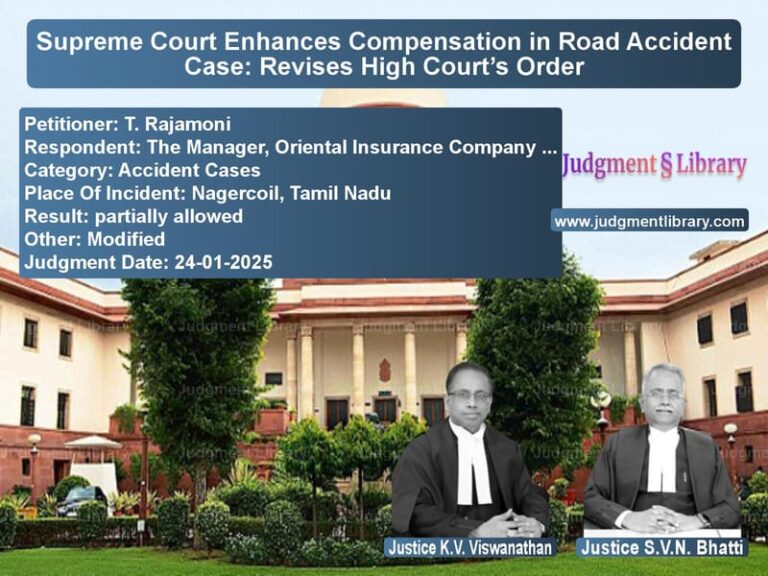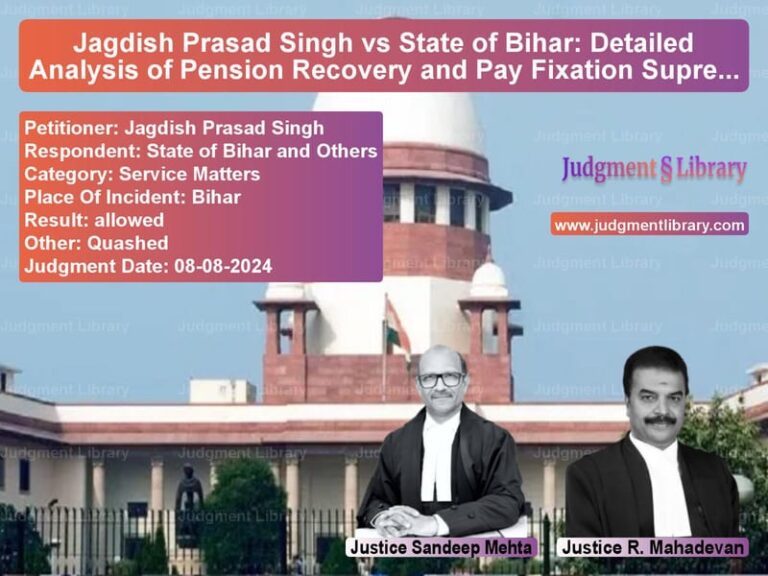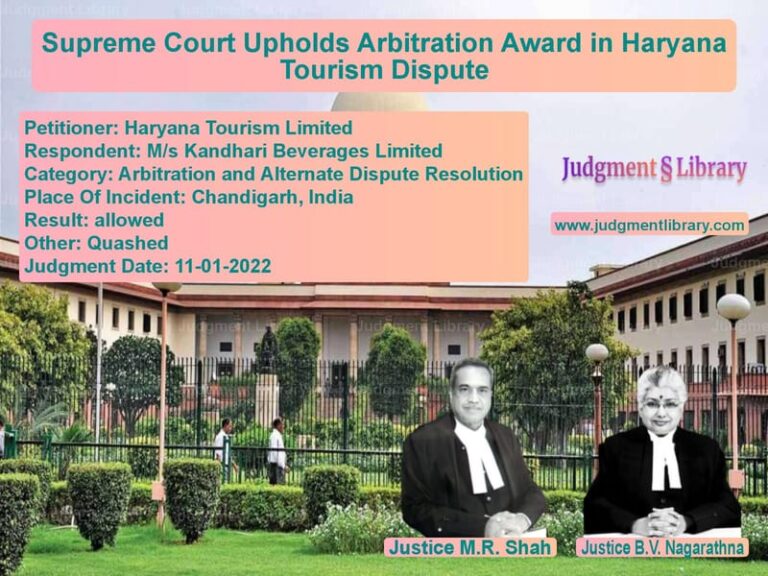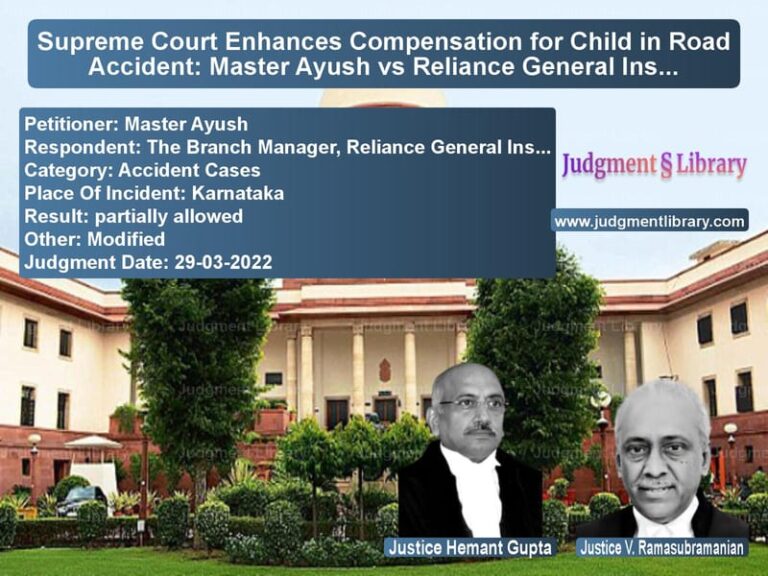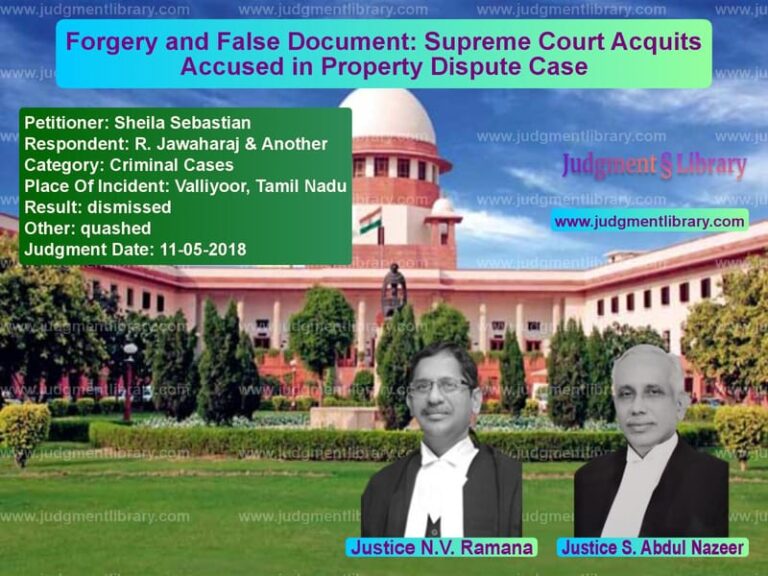Murder Conviction Overturned: Supreme Court Acquits Accused Due to Lack of Evidence
The Supreme Court of India recently delivered a significant judgment in the case of Suryavir vs. State of Haryana, where it acquitted the accused, Suryavir, who had been convicted for murder under Section 302 of the Indian Penal Code (IPC). The Court found that the prosecution failed to prove the case beyond reasonable doubt, emphasizing the importance of substantive evidence in criminal trials.
Background of the Case
The case arose from an incident on 01.10.2008, when one Rajinder alias Raju was shot dead in Jind, Haryana. The prosecution alleged that the appellant, along with two other accused—Devender alias Dhola and Pardeep—conspired to murder the victim due to an ongoing dispute over property.
Key developments:
- FIR No. 566 was registered based on a complaint by the victim’s father, Om Prakash (PW-12).
- Eyewitnesses, including the victim’s mother, Janki Devi (PW-15), testified that three individuals arrived on motorcycles and shot Rajinder.
- Post-mortem confirmed gunshot wounds as the cause of death.
- The Trial Court convicted two of the accused—Suryavir and Devender—but acquitted Pardeep due to lack of evidence.
- The Punjab and Haryana High Court upheld the convictions.
- While Devender’s appeal was dismissed in 2016, Suryavir’s appeal reached the Supreme Court in 2022.
Petitioner’s Arguments
- The petitioner’s counsel contended that the case was based on circumstantial evidence and lacked direct proof of the accused’s involvement.
- The FIR initially stated that the assailants arrived in a white car, but later testimony changed this to motorcycles, showing inconsistencies in the prosecution’s case.
- The key eyewitnesses (PW-12 and PW-15) admitted that they had not seen the accused before the incident and relied on rumors to identify them.
- No test identification parade was conducted, which is crucial when the accused are unknown to the witnesses.
- The recovery of weapons allegedly used in the crime was not supported by conclusive forensic evidence linking them to the murder.
Respondent’s Arguments
- The State of Haryana maintained that the evidence on record was sufficient to uphold the conviction.
- The prosecution argued that minor inconsistencies in witness statements should not overshadow the overall evidence.
- The circumstantial evidence, combined with recovery of weapons, was sufficient to establish the guilt of the accused.
Supreme Court’s Judgment
The Supreme Court set aside the conviction and acquitted the accused, stating that the prosecution had failed to establish its case beyond reasonable doubt.
Key Observations of the Supreme Court:
- The Court noted that PW-12 and PW-15 were unaware of the assailants’ identities and their allegations were based on hearsay.
- It held that the absence of a test identification parade weakened the prosecution’s case.
- The inconsistencies in witness statements—initially mentioning a white car and later motorcycles—cast serious doubt on the credibility of the evidence.
- Box identification of the accused in court, without prior identification proceedings, was deemed unreliable.
- The Court ruled that mere recovery of weapons, without forensic evidence linking them to the crime, was insufficient to establish guilt.
Key Excerpts from the Supreme Court Judgment
The Court observed:
“The source of information regarding the identity of the assailants was never disclosed, nor was any independent witness examined to establish this fact. The entire case rests on assumptions and inconsistencies.”
On witness credibility, the Court held:
“In the absence of primary evidence establishing the identity of the accused, mere allegations and assumptions cannot substitute for proof beyond reasonable doubt.”
Regarding the lack of forensic linkage, the Court stated:
“Recovery of weapons, without ballistic or forensic evidence connecting them to the crime, cannot be the sole basis for conviction.”
Final Verdict
The Supreme Court allowed the appeal and issued the following directions:
- The appellant, Suryavir, was acquitted of all charges and ordered to be released immediately.
- The conviction of co-accused Devender, whose appeal was earlier dismissed in 2016, was also reviewed. The Court granted him the same benefit and acquitted him as well.
- The jail authorities were directed to take necessary action for the immediate release of both accused.
Conclusion: Implications of the Judgment
This ruling highlights fundamental principles of criminal law and the burden of proof:
- Witness testimony must be consistent, and hearsay evidence cannot form the basis of a conviction.
- Test identification parades are crucial when the accused are previously unknown to the witnesses.
- Circumstantial evidence must form a complete chain leading to only one conclusion: the guilt of the accused.
- Forensic evidence linking weapons to the crime scene is necessary for a conviction based on weapon recovery.
This decision reinforces the importance of ensuring that criminal convictions are based on reliable, substantial evidence and not assumptions, thereby upholding the principle of “innocent until proven guilty.”
Petitioner Name: Suryavir.Respondent Name: State of Haryana.Judgment By: Justice Uday Umesh Lalit, Justice Pamidighantam Sri Narasimha.Place Of Incident: Jind, Haryana.Judgment Date: 03-02-2022.
Don’t miss out on the full details! Download the complete judgment in PDF format below and gain valuable insights instantly!
Download Judgment: suryavir-vs-state-of-haryana-supreme-court-of-india-judgment-dated-03-02-2022.pdf
Directly Download Judgment: Directly download this Judgment
See all petitions in Murder Cases
See all petitions in Attempt to Murder Cases
See all petitions in Fraud and Forgery
See all petitions in Theft and Robbery Cases
See all petitions in Extortion and Blackmail
See all petitions in Judgment by Uday Umesh Lalit
See all petitions in Judgment by P.S. Narasimha
See all petitions in allowed
See all petitions in supreme court of India judgments February 2022
See all petitions in 2022 judgments
See all posts in Criminal Cases Category
See all allowed petitions in Criminal Cases Category
See all Dismissed petitions in Criminal Cases Category
See all partially allowed petitions in Criminal Cases Category


